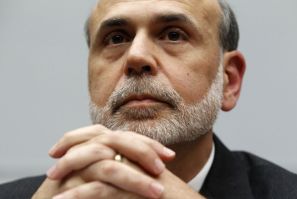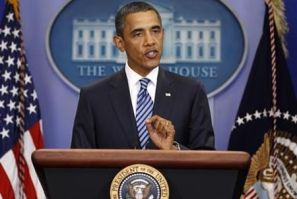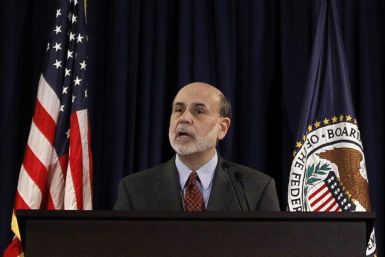The Federal Reserve's $600 billion Treasury buying spree is over and the bond market is growing nervous now that its biggest bidder has stepped aside.
The Federal Reserve's $600 billion Treasury buying spree is over and the bond market is growing nervous now that its biggest bidder has stepped aside.
Pimco chief Mohamed El-Erian on Thursday put low odds on a third round of U.S. monetary stimulus unless there is a major further deterioration in the U.S. economic outlook.
Asian shares drifted up toward a one-month high on Thursday as Chinese bank shares bounced higher on hopes of a near-term pause in policy tightening, while the euro steadied before a widely expected rate hike from the European Central Bank later in the day.
The Bank of Japan is expected to hold off on easing monetary policy further and revise up its assessment of the economy next week, encouraged by a pickup in factory output and recovery in business sentiment hit by the devastating earthquake in March.
Asian stocks steadied near one-month highs on Tuesday as market players took a breather after five consecutive days of gains while the Australian dollar dipped ahead of a policy meeting of the country's central bank where it may signal a dovish stance.
Asian stocks were steady near one-month highs on Tuesday as market players took a breather after five consecutive days of gains while the Australian dollar slipped ahead of a policy meeting of the country's central bank.
Since June 15, there has been a significant rise in Treasury yields. Below we present several reasons for the spike and why we think that interest rates will continue to move higher.
Asian equities climbed a fifth consecutive session on Monday, led by Chinese stocks, though the euro turned lower after ratings agency S&P warned that any rollover of Greek's debt would constitute a default.
Asian equities climbed a fifth consecutive session on Monday, led by Chinese stocks, and the euro inched higher as some near-term risks receded about Greece's funding for the rest of the year and a slowdown in China appeared relatively moderate.
Asian stocks climbed and the euro inched higher on Monday after policymakers approved an emergency tranche of funding for Greece, offering a lifeline to the debt-stricken nation while strong U.S. data also boosted demand for risky assets.
A top Federal Reserve official said on Thursday large-scale bond buying can be an effective monetary policy substitute when the central bank runs out of room to cut interest rates.
The Federal Reserve should be prepared to act to support the economic recovery again if growth disappoints, a top official said on Thursday, the day the central bank's latest bond buying round ended.
LONDON - Investors have become a little more upbeat heading into the second half of the year, lifting stock allocations from 2011 lows but remaining cautious with plenty of safe-haven cash and bonds.
The head of the world's most powerful central bank essentially stuck to the bank's latest U.S. economic forecast in his news conference with reporters Wednesday: the U.S. economy slowed in Q2, but growth is likely to pick-up in the second half of 2011.
Stocks edged higher on Wednesday after an upbeat outlook from FedEx as investors awaited the Federal Reserve's assessment of the economy and any clues about plans for dealing with recent weakness.
Ben Bernanke will have to answer at his press conference the big soft patch question.
Stocks seesawed between modest gains and losses on Wednesday ahead of the Federal Reserve's assessment of the economy and any plans for dealing with renewed weakness.
Stocks were set for a lower open on Wednesday as investors were cautious about the direction the Federal Reserve would take to deal with renewed weakness in the economy.
Stock index futures dipped on Wednesday as investors were cautious on what direction the Federal Reserve would take to deal with renewed weakness in the economy.
The Federal Reserve on Tuesday began a two-day meeting against the backdrop of a weakening U.S. economy that will likely force policymakers to plan for the possibility that things may get worse.
The Dow Jones Industrial Average fell below 12000 points on Friday, threatening to bring the stock market to a sixth consecutive week of losses. It would be the longest such slump since 2002.
























